
Zhang Jun, China’s ambassador to the United Nations, addresses the media about China's position on Kashmir, August 16, 2019. (Photo: Li Liang)
New York (People's Daily) -- The United Nations Security Council held an informal consultation Friday on the agenda item "India-Pakistan question" and heard briefings by the UN Secretariat on the situation in Jammu and Kashmir.
The Council members are deeply concerned about the current situation and hope the relevant parties will exercise restraint and not take unilateral action that will escalate tensions.
Ambassador Zhang Jun, China’s permanent representative to the United Nations, said that the issue of Kashmir is a historical one between India and Pakistan and that according to relevant Security Council resolutions, the status of Kashmir is undecided and it is an internationally-recognized disputed area.
Zhang said the Kashmir issue should be resolved properly through peaceful means in accordance with the UN Charter, relevant Security Council resolutions and bilateral agreements. This represents the consensus of the international community.
“The constitutional amendment by India has changed the status quo in Kashmir, causing tensions in the region. China is deeply concerned about the current situation and opposes any unilateral action that complicates matters. We call upon the relevant parties to exercise restraint, act prudently, and in particular, not take actions that will aggravate tensions,” said Zhang.
India's move has also challenged China's sovereignty interests and violated a bilateral agreement on maintaining peace and stability in the border area.
“China is seriously concerned. I want to stress that such practice by India is not valid in relation to China and will not change China's exercising sovereignty and effective administrative jurisdiction over the territory,” he said.
Zhang said both India and Pakistan are China's friendly neighbors and major developing countries and are at a critical juncture in their development.
He said China calls on the two sides to set aside their historical grievances to find a proper solution that will bring peace to South Asia, discard the zero-sum game mentality, avoid unilateral action, and settle their dispute peacefully to jointly maintain stability in the region.


